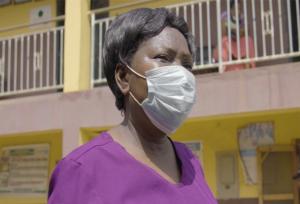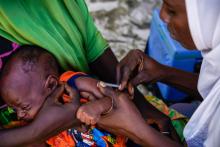Gender-responsive support from Nigeria’s polio eradication programme to tackle COVID-19 vaccine hesitancy
Ibadan, 27 April 2022 - Fatunmobi Christiana, a nursing officer with nearly 30years of working experience, is very well-known in her community, particularly among mothers.
As matron and officer-in-charge of Idi-Ogugun Primary Health Care Centre in Ibadan Oyo State, her mission is to ensure no child falls victim to polio or any other preventable childhood disease.
With Nigeria currently leveraging its polio networks and infrastructure to help drive the COVID-19 vaccination response, female health workers like Christiana have been putting their expertise garnered over the years while working in polio eradication to good use, encouraging uptake of the COVID-19 vaccine in their local communities.
“Working on COVID-19 vaccination is similar to working in polio eradication; a common challenge associated with both diseases is vaccine hesitancy,” said Christiana. “Part of the job is to sensitize people so that they present for vaccination and that is exactly what we have been doing with COVID-19” she said.
Christiana’s colleague, Rukayiat Okanlawon, an immunization officer in Ibadan North Local Government Area, agreed that experience working as a polio frontline officer puts her in good stead for addressing COVID-19 vaccine hesitancy.
“We encounter a lot of misinformation about the COVID-19 vaccine in the field, which causes rumors and skepticism [in communities]. I am relying on the trust built during previous polio vaccination campaigns to encourage uptake of the COVID-19 vaccine in my own community. People trust that I will not advise them to receive a shot that will harm them,” she said.
Logos, ethos, pathos, and women
In situations where people refuse vaccination, it is up to health workers like Christiana and Okanlawon to visit the households and give advice on the benefits of immunization, and risks that come from low levels of coverage. Christiana firmly believes that many health interventions, including immunization, are most effective when delivered by women.
“In addition to the logical and ethical argument, women can more easily connect with caregivers at the doorstop as ourselves mothers, sisters, wives and daughters. For polio for instance, we empathize with parents when addressing concerns and explaining the importance of having their children immunized. This is important in establishing trust,” she said.
“Nigeria was able to eradicate wild poliovirus because of the employment of many vaccinators, especially women, who sensitized communities on the importance of vaccination. I am optimistic that Nigeria will also overcome COVID-19”, she added.
Achieving success
To help drive the COVID-19 vaccination response, the Nigerian Government, with support from the World Health Organization (WHO), began utilising polio networks since the onset of the Covid-19 pandemic. According to WHO State Coordinator in Oyo State, Bassey Enya Bassey, this has helped achieve significant success in terms of surveillance, contact tracing, and vaccination, with thanks to female health workers such as Christiana.
“The [health worker] capacity that has been built during the polio campaigns is one of the best things that has happened to Nigeria, and this has been obvious in terms of the success of various immunization activities. The involvement of Christiana and other women as polio frontline vaccinators plays a crucial role in health intervention and immunization services,” he added.
With support from WHO, Nigeria has been strategic with the inclusion of female polio workers across the country. From January 2020 to June 2021, women have made up approximately 80 % of the polio frontline workforce, vaccinating millions of children across the country.
Technical Contacts:
Dr Boateng Kofi; Email:boatengko [at] who.int (boatengko[at]who[dot]int)
Dr Samuel Bawa; Email: bawasa [at] who.int (bawasa[at]who[dot]int)

